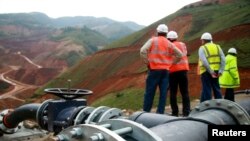Industrial mining firms have been put on trial, symbolically, in a documentary film being shot in the east of the Democratic Republic of Congo. A so-called tribunal, organized by Swiss film maker Milo Rau, has been hearing testimony for and against the firms, mainly against them, during two days of hearings in the city of Bukavu.
Milo Rau is a 38-year-old film director with his own production company, called the Institute of Political Murder. He has been described by a German newspaper as the most controversial director of his generation.
His Congo film will center on a two-day "citizens tribunal" that he organized in the eastern DRC city of Bukavu. The event had no legal authority, but he persuaded real lawyers, including some who have worked at the International Criminal Court, to take part.
They conducted the proceedings with a jury of Congolese politics and mining experts, in front of a large local audience, including the governor of South Kivu province.
The first day of hearings concentrated on disputes around two mining concessions, owned by multinational firms Alphamin Resources and Banro. Alphamin has only started industrial mining in Congo in the past year, but Banro has been mining industrially in South Kivu since 2011.
Three witnesses complained that Banro had not adequately compensated them for being evicted from the company's land.
A witness told the tribunal she and her family had had three houses on Banro’s concession at Luwhindja before they were evicted. She said the company had built two houses at a new site, for her and for one of her children, but another of her children was not given a house. Her other main complaint was that Banro resettled her at a site where she cannot raise her livestock.
The leading investigator at the tribunal was Sylvestre Bisimwa, who regularly works at the International Criminal Court.
Bisimwa asked another witness, Peter Mugisho, an activist from Luwhindja, why Banro chose to resettle the evicted families at an unsuitable site.
"I do not think Banro chose the site," he replied. "There was a process whereby some members of the community were consulted, but they did not consult the people directly concerned."
Several witnesses wore masks and spoke through voice distorting machines to conceal their identity. One of these anonymous witnesses claimed he was a former member of a rebel group, and said his group had been formed to defend the interests of small-scale miners at the Bisie mining site.
Other witnesses and audience members said for the many miners who have already been evicted by these two firms and for the estimated two million or more artisanal miners still working in the country, industrial mining is not good news because they will likely struggle to make as good a living in other occupations.
The expert jury reached a similar conclusion. Jury member Venantie Bisimwa Nabintu summed up their views.
"At this stage," she said, "our judgment is that no industrial mining operation [in the region] has been accompanied by adequate investment in infrastructure, job creation or support to local communities."
“If they made this investment," she adds, "the mining companies could contribute to peace and democracy in the region.”
She also said that mining firms have taken advantage of the DRC’s instability to acquire concessions on terms unfavorable to local communities, which in the jurors’ view amounted to pillage.
Banro declined to be represented at the tribunal. In 2014 the company reported that since starting work some 10 years ago it had invested $766 million at its two sites in the DRC, including $40 million on local roads and buildings and about $4.5 million on social projects.
Rau's film on the mining issue and the tribunal is scheduled for release in the late 2016.




